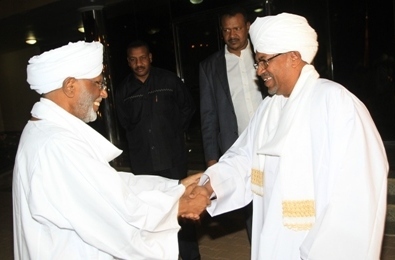Sudan’s PCP calls on Bashir to personally invite rebel groups to join dialogue
April 5, 2014 (KHARTOUM) – The deputy secretary-general of the opposition Popular Congress Party (PCP) Ali al-Hag Mohamed has urged president Omer Hassan al-Bashir to undertake certain steps in order to ensure success of the national dialogue initiative.

He said in statements broadcasted by the state-run Radio Omdurman on Friday that the invitation should coincide with Bashir’s anticipated meeting with political parties, urging rebel groups to respond positively to the president’s call.
Al-Hag, who spoke from the Qatari capital of Doha, said that dialogue on issues of war and peace and the economy must be preceded by a consensus on the laws and freedoms.
He suggested that all issues must be discussed simultaneously through several committees in order to arrive at a comprehensive political agreement, underscoring the need for agreement on a mechanism for administering the dialogue before engaging in it.
The Islamist figure saw that every political party or trade union must submit a written vision prior to the beginning of the dialogue and stressed the need for determining who should take part in the dialogue and how many representatives will participate, affirming the need for publicity and transparency of the dialogue.
He further said that dialogue cannot take place in the absence of the media, arguing that the dialogue mechanism which will be agreed upon should broadcast outcome of the dialogue rounds in the local and international media.
“Media and publicity are the main guarantors for the success of the dialogue”, he added
The PCP official emphasised that credibility represents a major challenge for the dialogue, saying some parties including his have doubts and reservations on the dialogue and the necessary guarantees for its implementation.
He mentioned that his doubts are based on failure to implement previous agreements when he was part of the government during the 90’s, saying that all rebel groups took part in the government in one way or another.
Al-hag denied that the PCP has more influence on the rebel groups than other political parties, saying they stand at an equal proximity from all rebel groups.
“I believe all political forces should play a role towards convincing rebel groups to join the national dialogue,” he said.
He said that the meeting between the Qatari deputy prime minister, Ahmed bin Abdalla Al Mahmoud, and the PCP leader Hassan al-Turabi who is currently visiting Doha, discussed recent developments in Sudan particularly the situation in Darfur besides the dialogue between the government and the political parties.
In a televised address to the nation late last January, the Sudanese president announced a four-point plan for reform “to stop the war and bring peace, free political society, fight against poverty and revitalise national identity”.
He further called for political forces and even rebel groups should they lay down arms to engage in dialogue to agree on the implementation items to achieve these objectives.
Bashir afterwards met with several opposition leaders, but it is not yet clear how the dialogue call will be implemented amid deep scepticism over the willingness of the ruling National Congress Party (NCP) to implement deep reforms.
So far NCP officials, including Bashir, have brushed aside opposition calls for the 2015 elections to be delayed and the formation of a transitional government that would work on drafting a new constitution to prepare the country for the polls.
The opposition National Umma Party (NUP) and the PCP are the only major opposition parties who have so far accepted Bashir’s call for national dialogue.
But both parties warned that they would pull out of dialogue with the NCP if no progress is made.
(ST)
